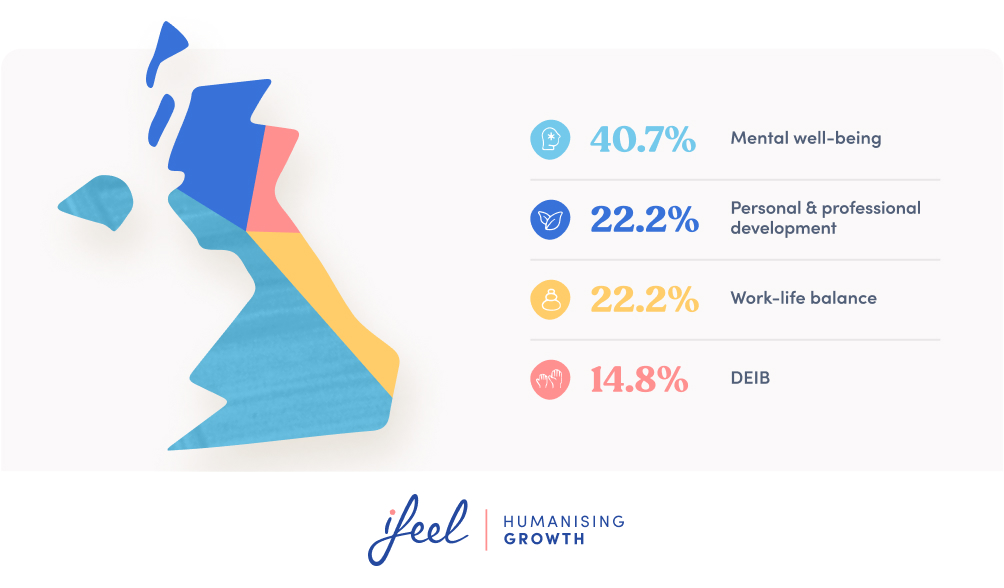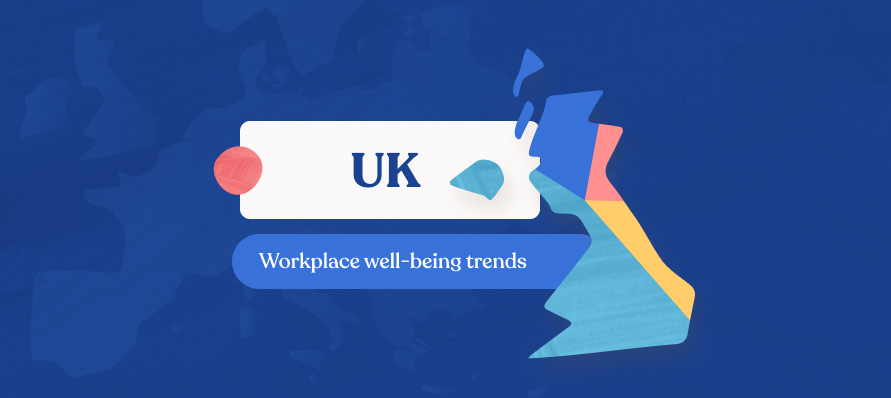Unlocking the future of employee mental health across Europe
Employee mental well-being is at the forefront of corporate agendas across Europe. As companies look to foster healthier, more productive work environments, understanding the diverse needs of employees across different countries has never been more critical. But how does the UK stack up compared to the rest of Europe?
Our latest research dives deep into these mental health trends, giving employers actionable insights and strategies to create supportive workplaces. Keep reading to explore key trends across mental well-being, work-life balance, diversity, equity, inclusion, and belonging (DEIB), as well as personal and professional development.
👉 Don’t miss out on exclusive data! Download our free whitepaper, ‘Mapping the Impact,’ for in-depth insights on elevating workplace well-being.
Key trends shaping workplace well-being
Our analysis focuses on four major categories that impact employee mental health across Europe:
- Mental Well-being: Anxiety, depression, stress
- Work-life Balance: Family support, maternity/paternity, sleep
- DEIB: LGBTQA+ inclusion, disability, sexuality
- Personal & Professional Development: Skill growth, social abilities
Each of these categories sheds light on different facets of workplace well-being and offers companies a roadmap to improve their employees’ mental health, job satisfaction, and overall productivity.
Breaking down well-being across Europe
- Mental well-being (38%)
Mental health remains the most pressing concern across Europe. About 10% of Europeans face mental health disorders such as depression or anxiety at any given time, with women particularly impacted. These findings emphasise the urgent need for strong mental health programs in workplaces. - Work-life balance (22%)
Employees are increasingly seeking balance between work and personal life. Long working hours and job stress continue to take a toll on employee health, highlighting the need for policies that support flexible work arrangements. - Personal & professional development (24%)
The drive for self-improvement and career growth is strong, with 24% of employees across Europe prioritising professional development. Investing in learning and development opportunities can directly contribute to improved job satisfaction and mental health. - DEIB (15%)
Diversity, equity, inclusion, and belonging are crucial in fostering a positive workplace culture. Companies that invest in DEIB initiatives not only reflect the diversity of the European workforce but also build stronger, more cohesive teams.
How the UK Measures Up: A Deep Dive Into UK Trends
So, how does the UK compare to the European averages across these key well-being categories? Let’s take a closer look:

Mental well-being: 40.7% (UK) vs. 38% (Europe)
Demand for mental well-being support is slightly higher in the UK, with 40.7% of employees prioritising mental health resources. This increase may be due to greater workplace stress and growing awareness of the importance of mental health in the workplace.
Implications for employers:
UK companies should continue to prioritise mental health support through services like therapy, mental health resources, and fostering a culture that encourages open conversations about mental health. By addressing these issues, employers can reduce stress, boost satisfaction, and enhance productivity.
Work-life balance: 22.2% (UK) vs. 22% (Europe)
The UK aligns closely with the European average when it comes to work-life balance. As remote work and flexible schedules become more prevalent, employees are increasingly seeking environments that respect their personal time.
Implications for employers:
Companies should offer flexible working options like hybrid models and flexible hours, while promoting a culture that values time off to help employees maintain a healthy balance between work and personal life.
Personal & professional development: 22% (UK) vs. 24% (Europe)
In the UK, the demand for personal and professional development is slightly lower than the European average. This could suggest that UK employees feel they have more opportunities for career progression compared to other countries.
Implications for employers:
While demand may be lower, companies should still invest in training, mentorship, and career advancement programs to keep employees engaged and competitive in the job market.
DEIB: 14% (UK) vs. 16% (Europe)
Demand for DEIB initiatives is slightly lower in the UK, indicating that many companies are already taking active steps to promote diversity and inclusion in the workplace.
Implications for employers:
UK companies should continue strengthening their DEIB strategies by implementing inclusive hiring practices, diversity training, and supporting employee resource groups. These initiatives will foster a sense of belonging, boost employee engagement, and contribute to a positive company culture.

Take action: Create a supportive work environment with the leaders in mental well-being
Overall, the data for the UK suggests a strong focus on mental well-being, consistent with European trends, while also emphasising the importance of work-life balance and maintaining inclusive workplaces. By addressing these areas thoughtfully, UK companies can create healthier, more supportive, and more productive work environments.
To gain a deeper understanding of the mental health landscape in Europe, download the full report here.
Investing in employee well-being is not just a matter of compliance or corporate social responsibility; it is a strategic decision that can help companies thrive in an increasingly competitive and globalised market.
To assist in this process, our team of psychologists specialising in mental well-being has developed a mental well-being solution for large organisations aimed at helping companies enhance employee engagement and boost productivity.
This collaboration allows HR managers to receive personalised, data-based advice on the most effective measures for detecting employee mental health issues and assessing the workplace climate. It’s the best way to understand their needs.
We hope you found this article on key mental well-being trends in the UK interesting. If you want more information about our mental well-being solution for companies, simply request it, and we will contact your team soon.










